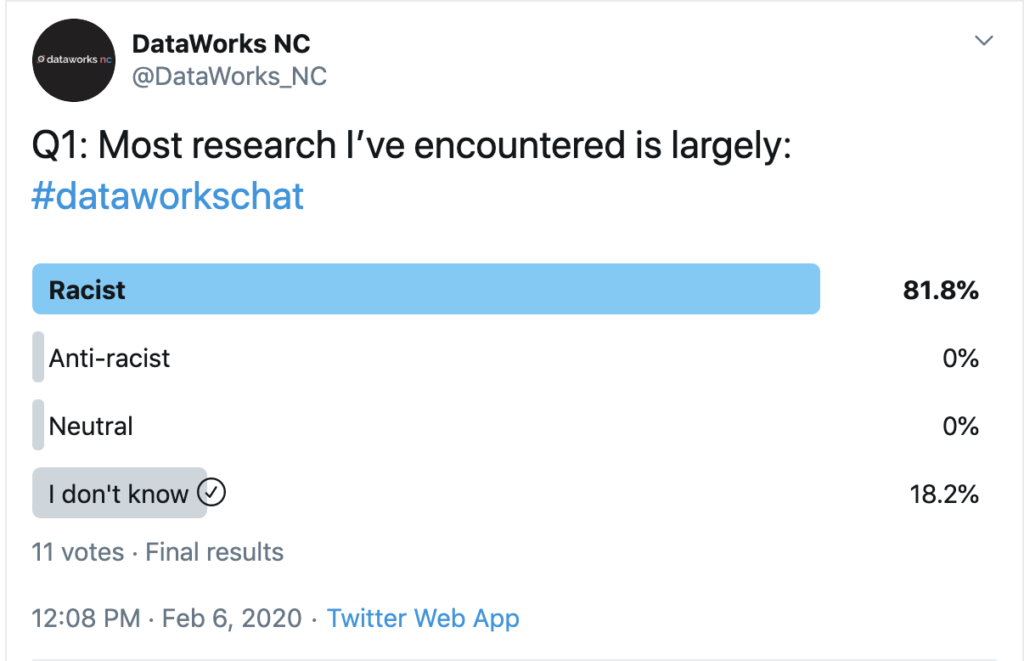On February 6, community activists and researchers participated in our first Twitter chat. Using the hashtag #dataworkschat, folks joined from our own city of Durham and as far away as Barcelona, Spain to discuss anti-racist research methods.
As a follow-up to a blog series on the topic, we posed 7 questions. Here are the highlights from the discussion:
First, we polled participants, and 82% said most of the research they’ve encountered lately is racist.

Given the realization that research results are generally Euro-centric, using whiteness as the default, these results weren’t surprising.
#dataworkschat This is based on what one’s definition of racism is. By racist research, I mean research that is heavily White centric and uses whiteness as a default.
Tia Hall (@YinTia) February 6, 2020
Sadly, the poll results don’t surprise me. Research is largely rooted in racist ideas, but we don’t often talk about ways to address these issues. #dataworkschat
Joelle Atere-Roberts (@JoelleARoberts) February 6, 2020
Not surprising at all. I think while most researchers have good intention, they don’t think critically enough of their work and the implications of the words they choose when talking about race and even when framing their research questions. #dataworkschat
Jessica Y. Islam, PhD, MPH (@jyislam) February 6, 2020
Referencing a tweet about BMI, we discussed representation in research.
#Dataworkschat Healthcare system doesn’t acknowledge past exploitations of Black people. Yet will blame Black people for not trusting the system. When I have truly needed pain medication and made to feel like I had to show that I was not a(n) addict.
Tia Hall (@YinTia) February 6, 2020
We heard a call to explicitly name power structures when reporting and conducting research results.
As a white man, I see *part* of that identity over-represented in research. I almost never see white male privilege (& structural racism, sexism) explicitly named or measured at any level or in the framing of questions. Over-representation is highly selective. #dataworkschat #A3
Mike Fliss (@mikedolanfliss) February 6, 2020
We talked about some re-framing approaches we are trying at DataWorks, for example, ways that pathologize white supremacy instead of poverty, and participants gave us some great ideas about what is possible in doing anti-racist research.
I love it! Flip the focus! Let’s stop talking about POCs as the population of “study.” This make(s) it seem that we need to change POCs, as they are the “problem group.” And let’s target the root cause. Which is #racism #whitesupremacy #dataworkschat
Jessica Y Islam, PhD, MPH (@jyislam) February 6, 2020
In visioning how to do this work, participants shared the values of listening to community, taking time to build relationships, considering how histories of oppression influence current disparities, and the importance of mentorship.
I’ve been trying to follow, take clear direction. Being a tool of groups working in environmental racism or anti-policing organizing for them to (optionally) wield. Self-agency exists for aspiring anti-racist white people like me, but only carefully. #dataworkschat #A5
Mike Fliss (@mikedolanfliss) February 6, 2020
Time and lots of it, both to develop mutual trust and to shift tack as needs change. Also feel like researchers being transparent about the personal benefits they hope to get out of collaboration (career-wise) can help? #dataworkschat
Tim Stallmann (@tim_maps) February 6, 2020
Yes. Another layer – a mentor of mine, Steve Wing, used to emphasize not just talking about privilege, but privilege as parasitism. The dynamics between under and over privilege, e.g. the extraction of wealth and distribution of waste. Not both in isolation. #dataworkschat #Q4
Mike Fliss (@mikedolanfliss) February 6, 2020
Equally as important, we were made aware of what simply doesn’t cut it.
Another anti-racist quant research myth to debunk- assuring a diverse sample and “adjusting” for race is NOT sufficient. #dataworkschat
Helen Cole (@hvscole) February 7, 2020
We wrapped up by sharing our living library about anti-racist research methods. We added recommended readings and encouraged participants to continue to add materials.
Thanks to all who joined us for our inaugural #dataworkschat. We encourage you to keep us in the loop as you learn. Please follow us on Twitter for updates and future Twitter chat invitations.

Leave a Reply